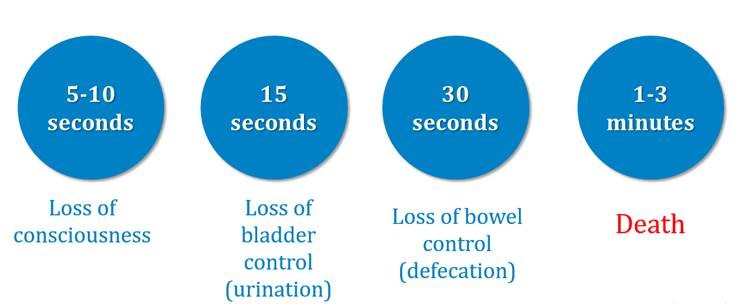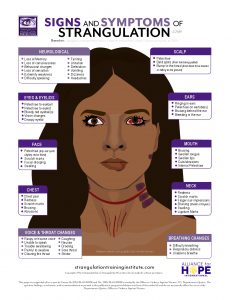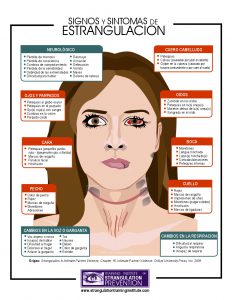Strangulation (“choking”)
If you or someone you know has experienced strangulation or has had their breathing cut off in any way for any length of time, please go to a hospital emergency room right away and ask for a CTA exam, even if the strangulation occurred in the past. You can also speak to an advocate at the Family Safety Center today at 615-880-1100.
Strangulation is a very dangerous form of abuse that occurs when someone blocks a person’s breathing by putting pressure on their neck or chest. Watch our video below to learn more about the impact and risk of strangulation (in English & Spanish):
Signs and Symptoms of Strangulation
If you or someone you know has experienced strangulation, even for just a few seconds, please look at these possible signs and symptoms below and download our Strangulation Brochure to help you track these:
Strangulation Brochure Folleto de Estrangulación (Spanish) Strangulation Safety Plan – Alliance for Hope
Click on the images below to learn more about some of the signs and symptoms:
Some common signs and symptoms are (please see the above photos for additional signs and symptoms):
- losing consciousness or passing out
- memory loss or confusion, may not remember parts of assault or strangulation
- small red or purple dots on your face, scalp, eyes, ears, or nose (this is called petechiae)
- burst blood vessels in your eye
- changes in your voice and difficulty speaking, swallowing, or breathing
- dizziness or lightheadedness
- changes in your vision
However, injuries that you can see only show up 50% or HALF of the time. You also may feel fine, but it’s very important that you see a doctor. Go to a hospital emergency room immediately and ask for a CTA exam if you have ever been choked or strangled.
Anytime someone makes it so you can’t breathe, you are at risk of serious health consequences that last days, weeks, or even months. Strangulation is also so dangerous because of how quickly it can lead to death.
Strangulation & Domestic Violence Statistics in Nashville
In 2024:
- The Office of Family Safety gave out 1,344 brochures to clients regarding strangulation.
- 893 Office of Family Safety clients that chose to answer the Danger Assessment indicated that their partner had strangled them at some point in their relationship.
- 558 of those (or 63%) indicated they had been strangled to the point of unconsciousness.
- The Office of Family Safety flagged 5,005 (or 36%) domestic violence criminal defendants and Order of Protection respondents as stranglers.
- 51% of victims who chose to answer the Lethality Assessment Protocol (LAP) indicated that their partner had strangled them.
If you or someone you know has experienced strangulation or has had their breathing cut off in any way for any length of time, please go to a hospital emergency room right away and ask for a CTA exam, even if the strangulation occurred in the past.
If you think that you are in an abusive relationship, look at our safety planning page for ways to increase your safety and our Other Help in Nashville page for community support.




